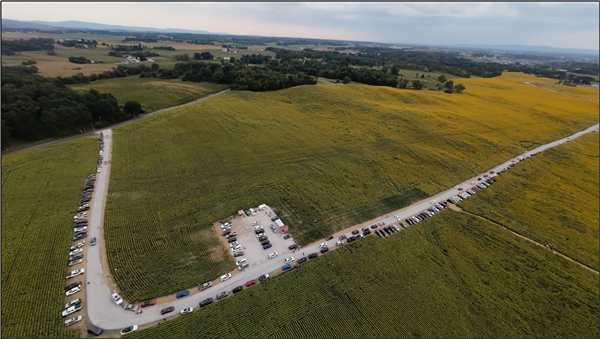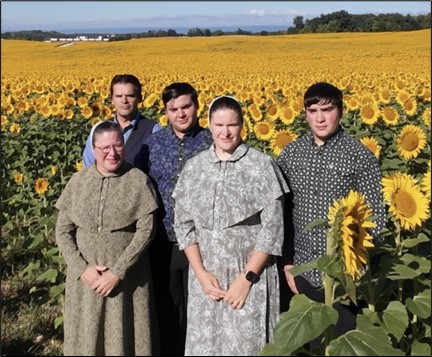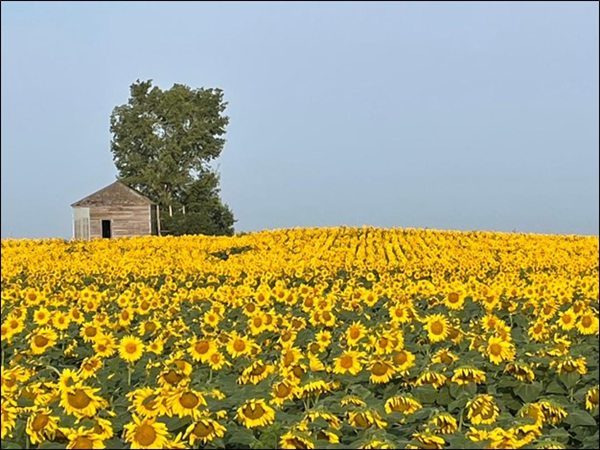 Cars line the road, bringing visitors to the sunflower fields at Lesher Poultry Farm, located near Chambersburg in south central Pennsylvania.
Cars line the road, bringing visitors to the sunflower fields at Lesher Poultry Farm, located near Chambersburg in south central Pennsylvania.
(Photo courtesy of Leslie Bowman)
Leslie Bowman never intended to be a sunflower farmer. There are a number of reasons why sunflower wasn’t on his radar — the first, and possibly biggest, is simply location: Bowman lives in Pennsylvania, which is not exactly a big sunflower growing state.
But an experiment in 2012 forever changed his mind.
The year before, a significant portion of their cropland was dedicated to soybeans. Their three-year crop rotation included corn, soybeans and wheat, followed by double-cropped soybeans. Bowman wanted to diversify and find a different double-crop option to plant after wheat. He started researching alternative crops — and that research led him to sunflower.
“I don't know that I'd seen many sunflowers being grown in Franklin County before that,” Bowman recounts. But the crop had caught his eye. In 2012, they planted their first experimental patch of sunflower. The experiment was only about 15 acres and brought challenges and a steep learning curve. Despite it all, Bowman was hooked. He started researching optimal seeding depth and equipment setup, and sunflower has been a regular part of their crop rotation ever since.
Bowman’s sunflower is used mostly for birdseed, which he says is in demand in Pennsylvania.
“Just about every store has a stack of black oil sunflower seeds for people to use to feed the birds,” he notes. “Pennsylvania is a good market for sunflower because people love to feed the birds.”
Bowman sells most of his crop to two clients; one uses the ’flowers as a cover crop seed and also sells some as birdseed. The other buyer bags them for birdseed and incorporates them into specialty feeds for livestock like chickens.
 The Bowman family includes Leslie, his wife Melanie and their three children — Shirit, Sebastian and Cyrus. Leslie’s mother was a Lesher. The family moved to the Chambersburg area in the early 1800s.
The Bowman family includes Leslie, his wife Melanie and their three children — Shirit, Sebastian and Cyrus. Leslie’s mother was a Lesher. The family moved to the Chambersburg area in the early 1800s.
And chickens are something Bowman knows a lot about. His family has been raising chickens on their land in south central Pennsylvania since the early 1900s.
“My mom was a Lesher. Her family moved to Franklin County in 1808 and bought a piece of ground in 1812,” he says. The family still has about 25 acres of that original farmland. (Much of the original land was lost when an interstate highway was built.) But today they have more than 2,300 acres of farmland, while the family continues to focus on chickens. Lesher Poultry Farm currently raises about 390,000 egg-laying chickens, selling those eggs to grocery stores and wholesalers.
“We’re kind of a small operation in the grand scheme of things,” Bowman says. “There are many complexes that have well over a million chickens.”
But he likes the diversity of his operation, considering it a cornerstone of resilience and innovation.
Now, after growing sunflower for more than a decade, Bowman has noticed some real benefits.
“Diversity is key,” he emphasizes. “Adding sunflower as a double-crop option has been good for us. They can withstand colder temperatures than soybeans can, which gives us a couple more weeks of the growing season and helps them mature and dry down more effectively. And sunflower is more drought resistant than soybeans, which helps us spread the risk in drier years.”
Typically, Bowman tries to plant sunflower the first week of July; harvest usually extends into November and often December, depending on weather.
And, there’s one added benefit to sunflower Bowman didn’t expect. His sunflower acres have blossomed into a local attraction.
“People started stopping by the fields to take pictures,” Bowman relates. “My dad suggested leaving a few spots unplanted so people could park safely and take their pictures. That prompted people to stop who otherwise would have just driven by. We had a lot of people stopping.”
The farm gained the media’s attention too, as local newspapers and television stations featured their sunflower fields. In 2019, they created a Facebook page simply to manage the influx of phone calls about their sunflower. That boosted interest even more. This year, at the busiest time, there were more than 275 cars in the field.
There’s no charge to view the fields, but in 2018 Lesher Poultry Farm introduced a “you-pick” option. For $1 per head, visitors can pick sunflower. They’ve dedicated nearly an acre of special “you-pick” sunflower, including special varieties featuring red, white and bi-color flowers. A small on-site building offers visitors information and an opportunity to purchase family-made sunflower-related items.
 Leslie Bowman isn’t the only Pennsylvania farmer giving sunflower a shot. He believes sunflower acreage in the state has increased over the past decade, with more farmers, some entirely new to the crop, incorporating ’flowers into their rotations for grain production.
Leslie Bowman isn’t the only Pennsylvania farmer giving sunflower a shot. He believes sunflower acreage in the state has increased over the past decade, with more farmers, some entirely new to the crop, incorporating ’flowers into their rotations for grain production.
“Pennsylvanians love to feed the birds,” Bowman reiterates. “There is a strong demand for black oil sunflower seeds for birdseed here. There is also an interest here in sunflower, by farmers and by people who live in the cities.
“And let’s face it, sunflower [fields] are beautiful. I compare them to seeing a dolphin when you’re visiting the ocean. They just attract people’s attention and create a sense of wonder.”
You can follow the Lesher Poultry Farm’s sunflower journey on Facebook. Go to https://www.facebook.com/sunflowerwatch — Jody Kerzman